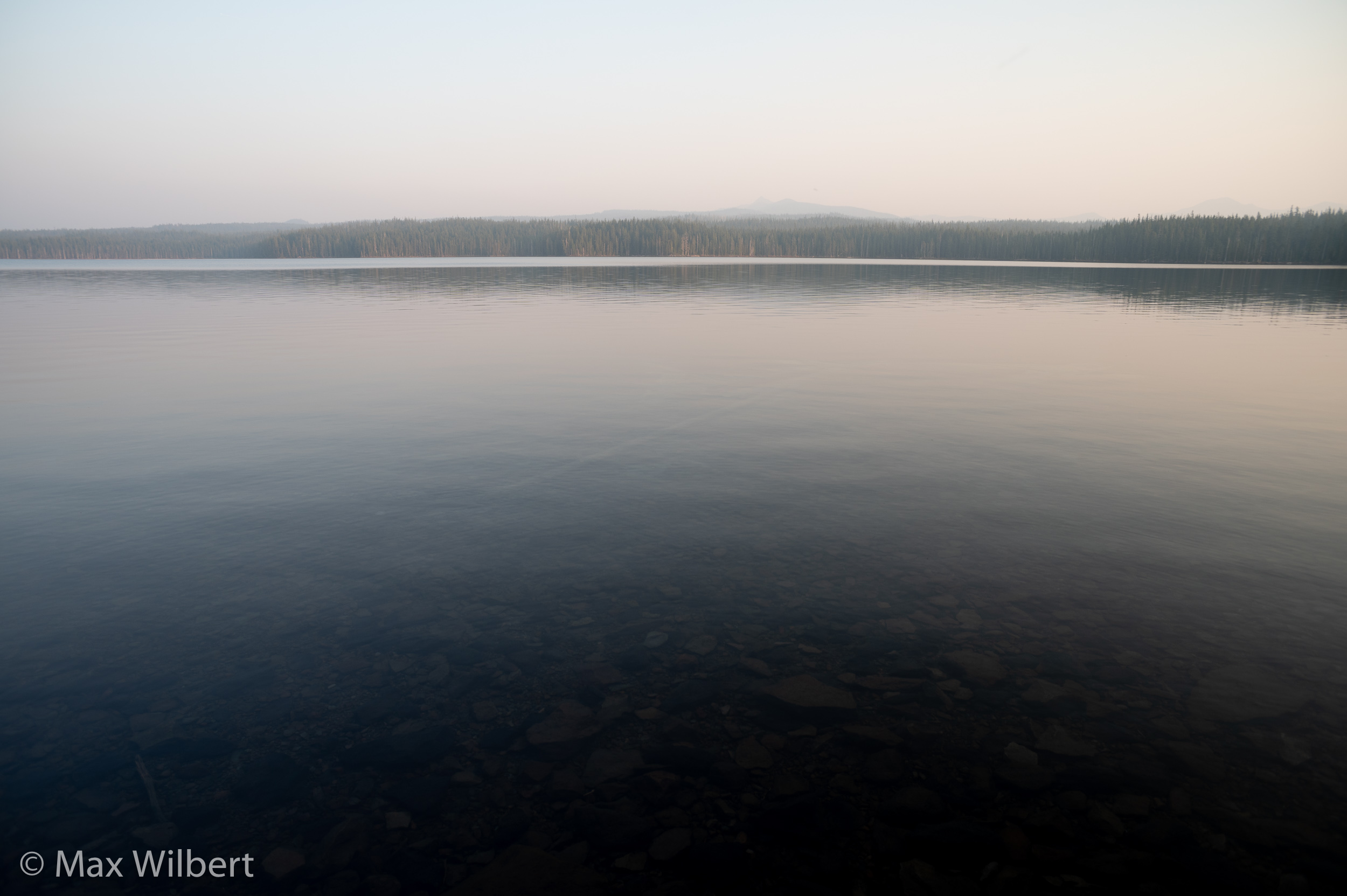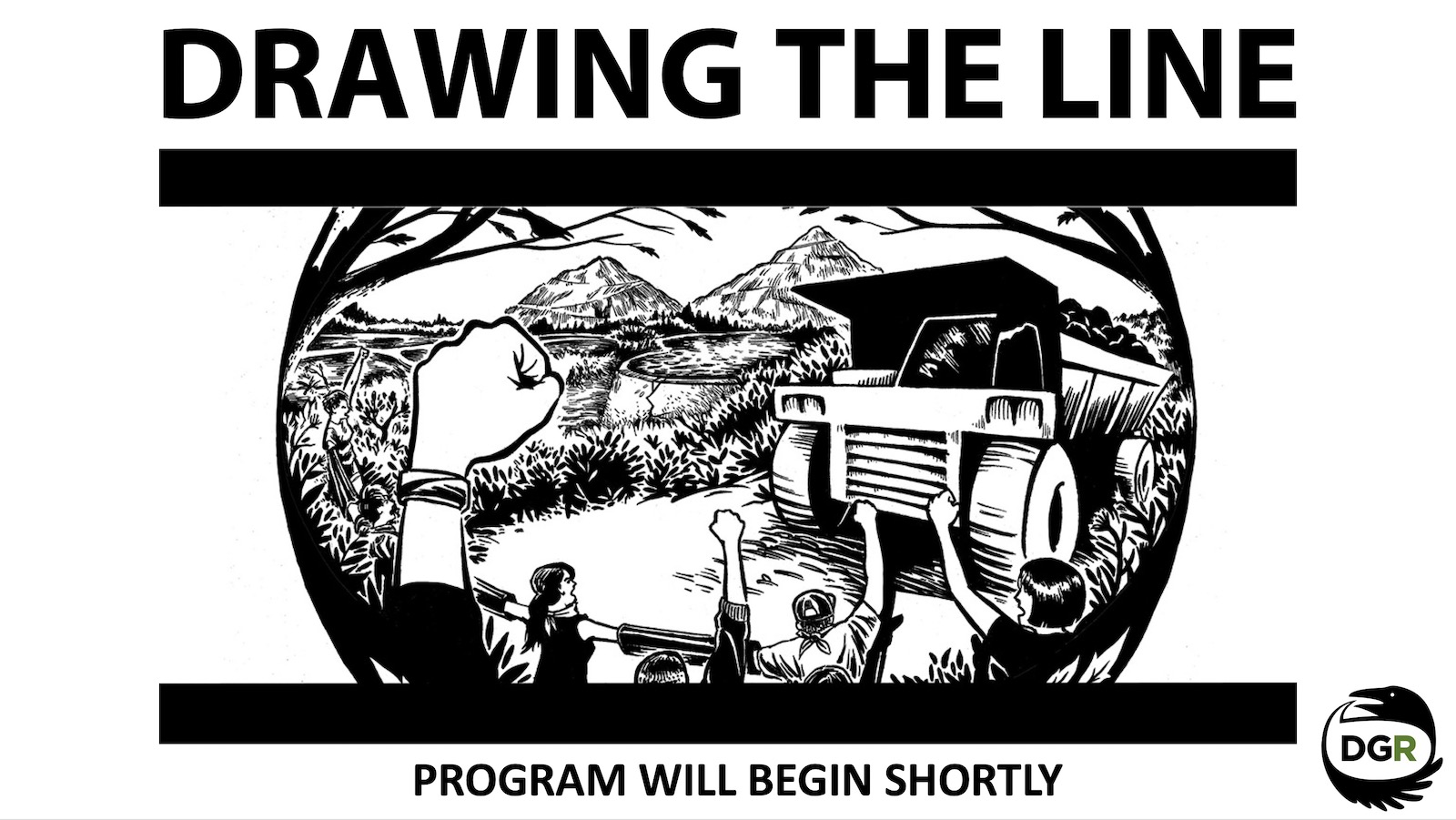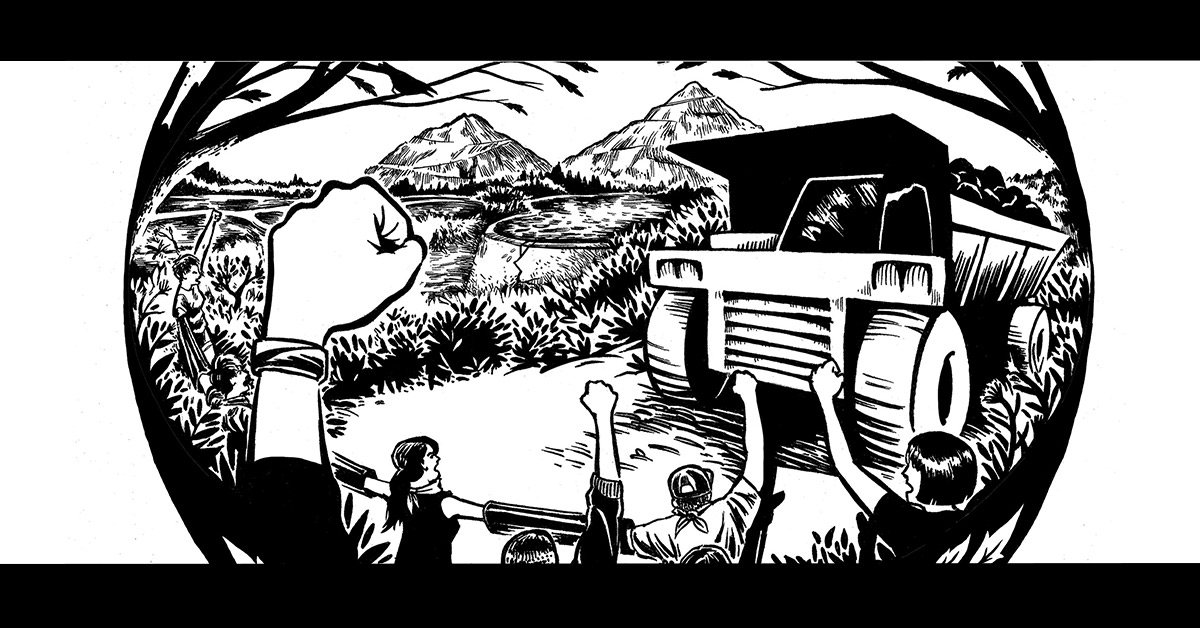
by DGR News Service | Jan 2, 2021 | Movement Building & Support
Max Wilbert responds to the statement “we are all doomed.”
by Max Wilbert
Anyone who is honest about the present state of affairs on this planet knows that things are very bad.
The oceans are dying. Coral reefs are collapsing. We’re living through a 6th mass extinction event; around 200 species are driven extinct every single day. And things are getting worse, fast. Emissions are rising, not falling. Pollution is increasing. Population is exploding. Energy consumption is skyrocketing. The permafrost is thawing and life as we know it—perhaps life itself—is under serious threat.
Meanwhile, economic inequality is at it’s highest level ever. The rich grow ever richer as the poor work to the bone, grow sick, and die. Meanwhile, popular culture glorifies technology, fast cars, and pornographic images. We live in a culture of adolescents ruled by sociopaths. The Amazon is falling, the forests burn, and millions of tons of plastic churn through the seas.
Despite how bad things are, there are multiple issues with the mentality of “we are doomed.”
First, it presupposes failure. That is not something we can afford at this point. If we have already failed in our minds—if we are already convinced of our defeat—that is a problem.
It is a victory for the dominant culture when we have lost our will to fight. One of the main objectives in any war is to destroy the opponents will to continue fighting. The dominant culture is always trying to destroy our will to fight, in many different ways, through all kinds of different propaganda. This is something that we need to overcome. When we become apathetic, when we say “there is nothing that can be done,” we are surrendering. And I, for one, do not mean to surrender until ever last tree, every last fish, and every last human being is dead.
As long as there is wildness and beauty in this world, there is something worth fighting for—and there is no time to waste wallowing in self-pity.
In some senses the doomer mentality is a parallel to the consumer mentality that says “everything is okay, go on with your shopping.” These two mindsets (doomer and consumer) coexist together very well. Both allow the status quo to continue.
A truly oppositional mindset looks at the dominant culture that is destroying life on this planet, sets itself in conscious political opposition, and organizes from this mentality, not from a sense of doom.
We need to organize with an understanding of reality. Things are very bad. We are deep in a hole. It’s not hyperbole to say that humans could even be driven extinct due to runaway global warming, ocean acidification, loss of biodiversity, and the collapse of the soils. These are serious trends, but it is not too late for life on this planet.
Action now can make a difference.
I have interviewed some of the top climate scientists in the world, and without exception, they all told me “it is not too late.” Everything we can do now to reduce the destruction of the natural world will create a better future.
Does this mean we have a great future? That everything is going to be fine? That there will be no problems? That we will live in utopia in no time?
Not at all. We are in for some dire times ahead. It is possible that in years to come we will look back at years like 2020 and, despite coronavirus, we may say “that was an easy year.” It’s likely that things will get worse.
It is ironic to me that many doomers, like me, actually have a roof over their head, food, and clean water. Many people around the world are already living in a state of collapse. In the short term, the future is grim.
So what can we do instead of simply saying “we are doomed” and then walking away? The more mature response is based on love for the planet, the beings on it, our family and friends, both human and non-human. The mature perspective works to protect and enhance the future no matter how much hope there is.
If you love then you keep fighting.
Sometimes you win. Sometimes you will change the situation and improve outcomes. There is no magic formula to make things better, but we can make fundamental changes. We can. We must.
If we defeat ourselves in our minds by believing that we are doomed, without taking action and fighting for what we love, then our souls have already been defeated.
If you would like to hear more about this subject, you can listen to an interview Max did with Michael Dowd on his “Post Doom” podcast.
Max Wilbert is a writer, organizer, and wilderness guide. A third-generation dissident, he came of age in a family of anti-war and undoing racism activists in post-WTO Seattle. He is the editor-in-chief of the Deep Green Resistance News Service. His latest book is the forthcoming Bright Green Lies: How the Environmental Movement Lost Its Way and What We Can Do About Itco-authored with Derrick Jensen and Lierre Keith. His first book, an essay collection called We Choose to Speak, was released in 2018. He lives in Oregon.

by DGR News Service | Nov 21, 2020 | Movement Building & Support
This article examines a few things we all can do to enhance our leadership skills.
By Max Wilbert
A friend of mine defines leadership as taking responsibility not just for yourself, but for a larger group or community. As she explains it, a leader tries to ensure things go well.
In general, activists are not very concerned with leadership. We tend to have an understandable mistrust of leaders. This is no surprise, as most leaders in the dominant culture abuse their power for profit and exploitation. But there is another type of leadership that is wise and moral and just. Leadership is extremely important, and we should learn basic principles from those who study leadership most seriously—often businesses and military. We can learn principles from these organizations, even if we disagree with their entire foundation.
This article shares 18 tips for leadership.
1. Learn From Others
Study those who came before, as well as present leaders you admire. Learn from their mistakes, as well as their successes – their weaknesses, as well as their strengths. Be a student of the past.
2. Build Skills
Writing, research, direct action, strategic thinking, fundraising, organizing, relationship building, outdoor skills, first aid, tactical skills—all these things can be learned. Study hard and apply your knowledge.
3. Work on Self-Confidence, Not Arrogance
You will never step up without self-believe. If you believe you are destined to never be a leader, you will not work to apply yourself and study. Step up with confidence, but not arrogance. Recognize your own weaknesses, as well as strengths, and build a team to shore up your weaknesses.
4. Take on Work
Leaders should not sit back and wait for others to do the work. Lead from the front, and be an example for others.
5. Share your Ideas
Even if you don’t know how to solve a given issue, use your intelligence to bring the group together, facilitate discussion, gathering insight, and so on. Learn to ask the right questions and share your thoughts when you have them. Speak up.
6. Listen to Others
Leaders need to listen to other people. Listen more than you speak. Learn from everyone.
7. Delegate
Build trust with your community and team, and delegate. One person has a limited capacity. Therefore, we have to build skills in other people to expand our capacity. This requires trust, and investing in people’s education and learning. People are the most valuable asset we have. Invest in people, even if it takes time for them to learn and adapt.
8. Respect Others
Leaders who abuse power are not and should not be respected. As a leader, you must earn respect, and one way to do so is by respecting others. People should be given respect as a default, unless they do something to lose your respect. Even then, you should be forgiving of those alongside you in the struggle.
9. There Are Many Types of Leaders
Some are loud, some are quiet. Some lead by planning and writing, others by action and speech. Some lead in private, others in public. Some lead while others rest. This is a strength. Cultivate all types of leaders.
10. Lead from the Front
People will not trust or follow a leader who is not willing to take the same risks as them, and get their hands dirty. Set an example for others with your action. Like the lead goose in a flying-V, the leader should do the most work, not the least (and when the time comes, the leader should cycle to the back, allow another to take the lead, and take a rest).
11. Moral Courage
Be prepared to do what is right. Understand consequences, and be prepared to accept them, if it is the right thing to do. When you act cowardly, reflect on why, and what you could do better next time. Commit to excellence and growth.
12. Physical Courage
Leaders should be prepared to take action in the physical world. Practice, prepare, and train in controlled situations to be ready for uncontrolled situations that will arise. Visualize yourself intervening in various scenarios. When opportunities arise, challenge your physical courage.
13. Foster Teamwork
A team is a fragile, unstable creation. Leaders must constantly work to stabilize the team, encourage people, and foster a shared strategic vision. Aligning people as individuals and the group as a whole pays major dividends.
14. Physical Fitness & Energy
As a leader you have a duty to be as physically and mentally fit as possible so that your decision making is as good as possible in stressful and challenging situations. Also, training yourself hard physically ensures you are familiar with the feeling of exhaustion and burnout, and know when you do need a break. Physical health and mental health are closely inter-related. The healthy person can think, act, and fight harder and most effectively.
15. Be Aggressive & Bold
Success in any endeavor entails risk taking. You can never control all factors. Seek to control and understand a situation as much as possible before acting—do not act rashly. But action is almost always better than inaction.
16. Be Decisive
Often, the wrong decision made quickly is better than the correct decision made too late. Rushing can be a path to failure, however, as well. Remember the saying: “Slow is smooth, smooth is fast.” Be methodical. Move as slowly as you have to in order to get the job done, and no slower. Move as quickly as you can, safely and intelligently.
17. Show Determination
Failures are inevitable. Prepare for them. Plan for them. Expect them. Then keep going. You will face setbacks, betrayals, losses and more. Organizing is not an easy path. Take care of your mind, spirit, and heart, so you can be in the fight for the long time.
18. Be Strong of Character
Self-discipline is the foundational skill. Be gentle with yourself, but allow yourself no excuses.
Max Wilbert is a writer, organizer, and wilderness guide. A third-generation dissident, he came of age in a family of anti-war and undoing racism activists in post-WTO Seattle. He is the author of two books, most recently Bright Green Lies: How the Environmental Movement Lost Its Way and What We Can Do About It (Monkfish, 2021 – co-authored with Derrick Jensen and Lierre Keith). He has been part of grassroots political work for nearly 20 years.

by DGR News Service | Nov 20, 2020 | Movement Building & Support
REMINDER: This Sunday, November 22nd, join us for a live streaming event—Drawing the Line: Stopping the Murder of the Planet—featuring Derrick Jensen, Lierre Keith, Chris Hedges, and grassroots activists from around the world.
The event will begin at 1pm Pacific (2100 UTC) and will be live streamed at https://givebutter.com/deepgreen.
Event Schedule
This Sunday, we ask: where do you draw the line? What is the threshold at which you will fight for the living planet? And how shall we fight?
This event will introduce you to on-the-ground campaigns being waged around the planet, introduce various strategies for effective organizing, rebut false solutions through readings of the forthcoming book Bright Green Lies: How the Environmental Movement Lost Its Way and What We Can Do About It, and discuss philosophy of resistance. There will be opportunities to ask questions and participate in dialogue during the event.
Donate to Support the Movement
The mainstream environmental movement is funded mainly by foundations which don’t want foundational or revolutionary change. Radical organizations like Deep Green Resistance therefore rely on individual donors to support activism around the world, which is why Drawing the Line is also a fundraiser. We’re trying to raise funds to support global community organizing via our chapters, fund mutual aid and direct action campaigns, and make our core outreach and organizational work possible.
Whether or not you are in a financial position to donate, we hope you will join us on November 22nd for this event! There will be a chance to ask questions and participate in dialogue. We hope to see you on Sunday.

by DGR News Service | Oct 26, 2020 | Movement Building & Support
Where do you draw the line? What is the threshold at which you will fight for the living planet? And how shall we fight?
This November 22nd, join Derrick Jensen, Lierre Keith, Chris Hedges, organizers from around the world, and guests for a special 4-hour live streaming event, Drawing the Line: Stopping the Murder of the Planet starting at 1pm Pacific time and hosted by Deep Green Resistance.
Event Program
This event will introduce you to on-the-ground campaigns being waged around the planet, introduce various strategies for effective organizing, rebut false solutions through readings of the forthcoming book Bright Green Lies: How the Environmental Movement Lost Its Way and What We Can Do About It, and discuss philosophy of resistance. There will be opportunities to ask questions and participate in dialogue during the event.
The mainstream environmental movement is funded mainly by foundations which don’t want foundational or revolutionary change. Radical organizations like Deep Green Resistance therefore rely on individual donors to support activism around the world, which is why Drawing the Line is also a fundraiser. We’re trying to raise funds to support global community organizing via our chapters, fund mutual aid and direct action campaigns, and make our core outreach and organizational work possible.
Whether or not you are in a financial position to donate, we hope you will join us on November 22nd for this event.
Save the Date

by DGR News Service | Oct 11, 2020 | Music & Art
I lay in my bed
Waiting for the soft lull of sleep to embrace me
To take me to the land where dreams come by
I know it won’t come soon
I know she faces the blockades
Obstacles block her way
I wake up to the low drum of the machine
I sleep to the blaring of the neighbor’s TV
Every moment in between is as loud as the other
The horns of vehicles speeding by
The excavators in their pursuit of development
Violence on my brothers and sisters
The rape of the natural world
Does it pierce my ears alone
Or is it my heart that suffers more?
If sleep finds her way through these
Could she also pass the bright night?
The flood light glowing outside my window
Keeps everyone safe, they say.
What dangerous world do we live in?
To keep one safe, ones must die:
The bugs, the plants, the birds, the frogs.
Don’t they know lights kill these all?
Moonlight and fireflies don’t bother me much
Neither does the beetles’ mating calls
I bet I could learn to sleep through
The mosquitoes buzzing around me
I long for the day when these are the only voices
That pierce the silence and darkness of night.
Salonika is an organizer at DGR South Asia and is based in Nepal. She believes that the needs of the natural world should trump the needs of the industrial civilization.





